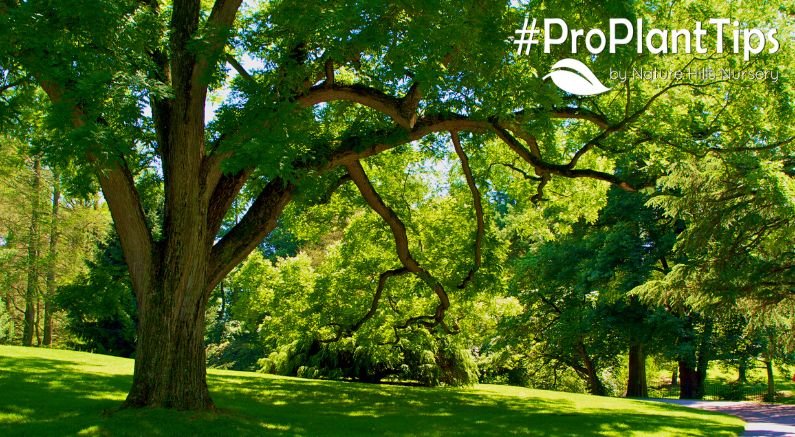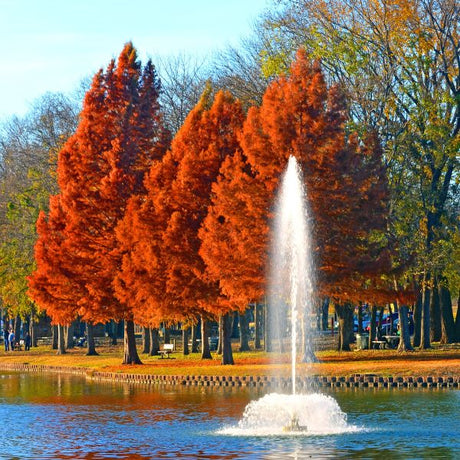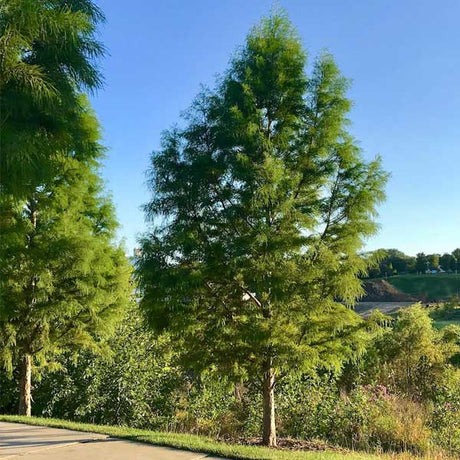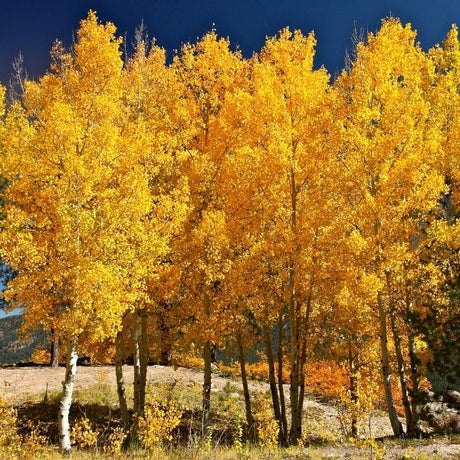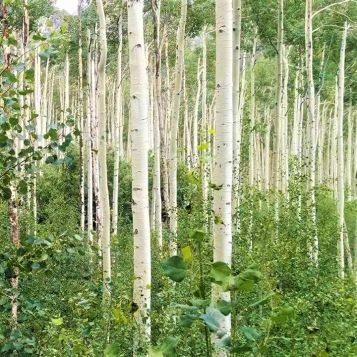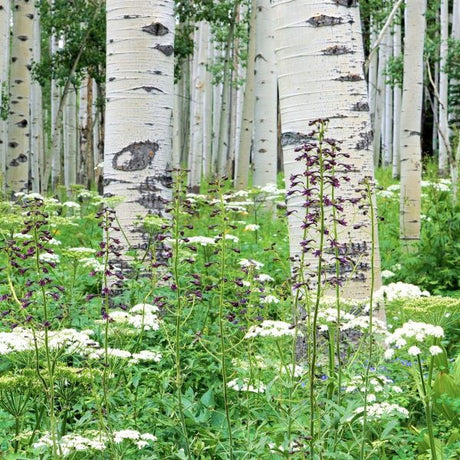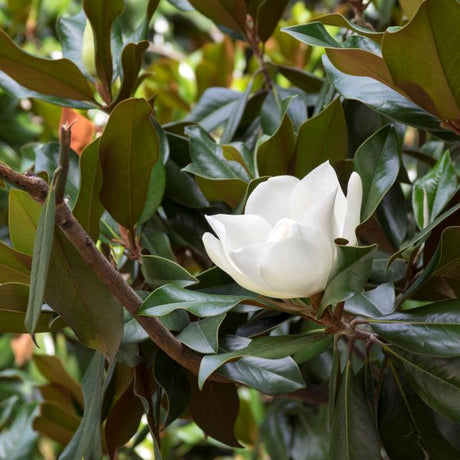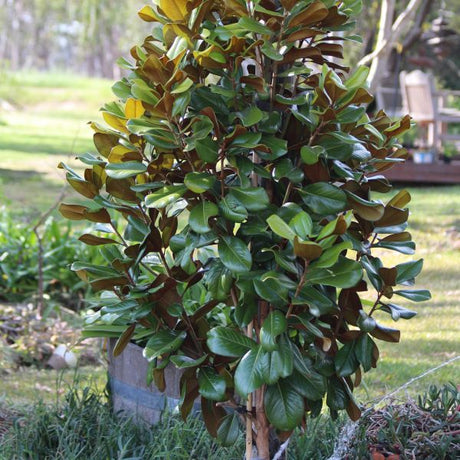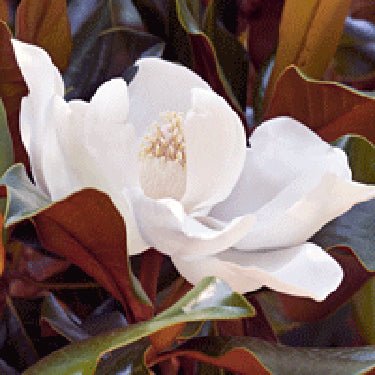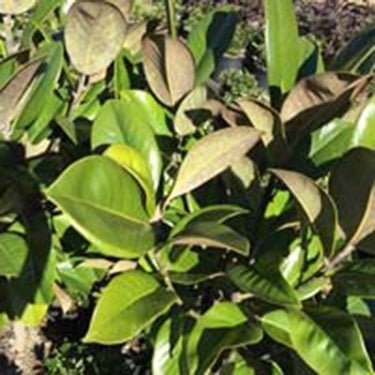The summer sun can take its toll on you, your home's cooling costs and on your landscape! How can you fix it without moving someplace colder?
Plant Trees!
“A society grows great when old men plant trees in whose shade they know they shall never sit.”
Benefits of Shade Trees

There are many reasons to plant a tree. They raise home and property values by up to 10%! They accent your yard and add height to your landscape. Some provide floral displays each spring, fruit in the summer or fall, autumn color, and structure in the winter snow.
Other trees block the view of something you dislike or keep prying eyes out of your yard. They also block sound and wind. Their roots stop erosion and their leaves enrich the soil, not to mention the stately multi-story hotels and luxury buffets they are for wildlife!
Intersperse your deciduous trees with evergreens, giving you a wide range of colors, shapes, sizes and textures to play with! You’ll enjoy watching faster-growing trees give you shade while slower-growing but longer-lived trees catch up in the long run.
But there are ways your tree helps improve the world that you may not have considered too!
Cool It Down!
Evapotranspiration is something trees just do naturally. It’s how they breathe and ‘sweat’ excess moisture. These massive living organisms work like people do, only in reverse. They take up groundwater and take in carbon dioxide while ‘exhaling’ moisture in the form of vapor and oxygen. It’s a win-win for us because, well, it's really a symbiotic relationship!
A single mature tree can take up thousands of gallons of water from the ground, (preventing flooding!) and then eject it into the air as vapor. This vapor, in combination with blocking the sun with its leaves, reduces summer temperatures anywhere between 2 - 9 °F! Just three mature trees around your home can reduce heating costs by a hundred dollars a year or more!

When planted in a strategic location around your home, you can reduce your cooling bill by $10 a month or more! Combined with a shade tree sited to shade pavement, driveways, seating and entertainment areas, parking lots, and street plantings, you reduce ambient air temperature and radiated heat even further!
Where to Plant Trees Around Your Home
Situate your deciduous tree to the east of your home to shade windows from the morning light that strikes your home before noon. Situate trees so they shade the west-facing sides of your home or building in the afternoons, especially during the summer months. Deciduous trees will lose their leaves in the fall, letting that light through to help warm your home during the cooler months of the year.

A tree that can reach 25 feet or taller at maturity should be planted 10 to 20 feet away from the east and west of your home because often, these larger root systems can cause some issues. Smaller trees can be a bit closer, while obviously taller trees will need a lot more wiggle room.
Smaller deciduous or evergreen trees and large shrubs, with their lower limbs to the ground, are best planted to the northwest and northeast of your home for late afternoon and early morning shade.
Check out the Nature Hills website for Shade Trees or give our knowledgeable customer service team a call for help selecting the tree height and width best suited for your property and growing zone!
Winter Time Benefits of Trees
Trees planted to the northwest of your home or building, especially evergreen trees, offer windbreaks to slow wind and therefore reduce your heating bill in the winter. You’ll also enjoy seeing something still green in the yard, even when there’s tons of snow.
You’ll also benefit from trees because they:
- Reduce water usage to maintain your lawn and garden beds
- Improve air quality as trees purify the air
- Reduce and sequester carbon emissions and greenhouse gas
- Control/prevent erosion
- Purif, filter and recycle rainwater/storm runoff
- Slow rain and wind
- Reduces/slows water and storm runoff - allowing for more water to soak into the ground
- Slows deterioration of pavement and cement from extreme elements
- Paint and stain won’t fade as fast
- Reduces soggy/wet spots (A mature Willow tree soaks up 100 gallons of water a day!)
- Reduce heat stress on your lawn and garden

And that’s not all! Planting just 2-4 trees around your yard will allow you to enjoy all these perks and money-saving benefits and then some for years! Talk about a great return investment?
Top 5 Nature Hills Shade Trees
Here are Nature Hills' top picks for some great Shade Trees that thrive in a wide range of growing zones, climates and conditions:
- Ginkgo Biloba - Highest Rated #1 on our Site
- Bald Cypress Tree - Most Widely Adaptable
- Royal Empress Tree - Fastest Growing
- Quaking Aspen Tree - Most Cold Hardy
- Green Giant Magnolia - Most Heat Tolerant

The honorable mention and best flowering shade tree is the Autumn Blooming Cherry tree!
Happy Planting!
What to do with all that refreshing shade you’ve created? Get a hammock, plant some shade-tolerant flowers and plants under its shade, set up that lawn chair, and relax! You deserve it! Pat yourself on the back while you lounge, knowing that you’ve done something great for yourself, your family, and the world! One tree at a time!
Check out all of Nature Hills Nursery's line of Shade Trees and Evergreen Trees today to help you and future generations cool their world!

